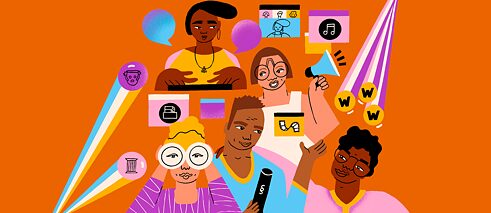“Latitude” Festival Media Library
Changing System Settings

At the “Latitude” festival, Nanjira Sambuli, Renata Ávila Pinto, Esra’a Al Shafei and Mi You searched for means for digital equality. Their discussion “Re-imagining the Internet” and many more contributions are now available in the digital festival’s media library.
When she was in her early twenties, Renata Ávila Pinto still believed in the Internet’s big promise to democratise knowledge production and reception. Today she laughs at her naïve elation. “We have come to the realisation that the systems that have been built – communication systems, police systems – are colonial in nature,” said the legal scholar and activist from Guatemala City. “And the internet is not an exception to it.” So she doesn’t believe that the Internet in its present form can be overhauled. Instead, she demands, “We need to start fresh.”
The Kenyan researcher, digital strategist and moderator of the discussion Nanjira Sambuli also hopes for a blank canvas on which a radically different Internet of the future can be drawn. The discussion “Re-imagining the Internet: Roadmaps to Digital Equality” was therefore not about thinking up ten-point plans for making the digital transition fairer, but instead offered a space for utopias. The panel unites voices that are still seldom heard in the discourse on digital inequality. “This session features experts who are non-male and non-western,” said Nanjira Sambuli about Renata Ávila Pinto, activist Esra’a Al Shafei and curator Mi You. “For us, we are here to create a new normal.”
New voices and new visions are also necessary because governments and large corporations are the ones now designing the Internet of the future. For example, Mi You, who works as a lecturer at the Cologne Academy of Media Arts, warns, “China is very much re-imagining the Internet for us,” and cites the digital Social Credit System with which the Chinese government monitors and controls the population as an example. An Internet of the future that does not translate the social and economic inequalities of the analogue world into the digital space, but overcomes them through fair design, is only possible if everyone is equally allowed to help shape it. The key question for Mi You is therefore, “How do we bring in the role of the community?”
The one-hour, English-language discussion “Re-imagining the Internet: Roadmaps to Digital Equality” as well as many other contributions are available in the media library of the “Latitude” digital festival.